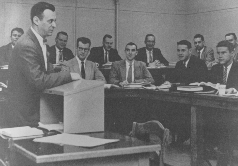1933
Purdue's first graduate to receive a bachelor's degree in economics. The following year he receives the first Purdue MS degree granted in economics.
1938
 Jay W. Wiley comes to Purdue as an instructor in the Department of History, Economics, and Government, which mainly teaches service courses for students in the schools of Agriculture and Science and in the Schools of Engineering. Wiley's Purdue career spans 44 years; he retires from Krannert in 1982 as professor emeritus of economics.
Jay W. Wiley comes to Purdue as an instructor in the Department of History, Economics, and Government, which mainly teaches service courses for students in the schools of Agriculture and Science and in the Schools of Engineering. Wiley's Purdue career spans 44 years; he retires from Krannert in 1982 as professor emeritus of economics.
(Professor Mart Fowler joined the economics faculty in 1947)
1953
Economics splits from Purdue's Department of History, Economics and Government and becomes the Department of Economics in the School of Science, Education and Humanities. President Fredrick L. Hovde hires Emanuel T. Weiler form the University of Illinois to head the new department.
1956
Purdue establishes the Department of Industrial Management and Transportation within the Schools of Engineering. Weiler heads both this new department and the economics department, thus having administrative responsibilities in two different schools. Ronald Stucky is the assistant to the head of Industrial Management.
Donald C. King joins the faculty as an instructor to teach Psychological Foundations of Industrial Management. He later also holds a number of administrative positions including director of professional master's programs and associate dean.
A Master of Science degree in industrial management (MSIM; later renamed Master of Science in Industrial Administration - MSIA) is proposed to and accepted by the faculty and the Graduate School. The first class in the new MSIM program is recruited, 34 men of whom 27 are Purdue graduates. Twenty-three have at least one year of job experience and several have as much as 10 years work experience. The class of 34 has been selected from about twice that number of applicants, largely graduates of the Purdue engineering schools. Emanuel Weiler recruits John S. Day from Harvard to help launch the MSIM program.
1957
 (Professor John S. Day teaching a master's class in 1957)
(Professor John S. Day teaching a master's class in 1957)
Twenty-nine men compose the first class to graduate from the management master's degree program. The average age is 26; over 50 percent are married. Among the graduates of this class is Arnold C. Cooper, who later joins the faculty after completing doctoral studies at Harvard. Cooper serves as director of the school's professional master's programs from 1985-87.
In January, Professor John Y. D. Tse joins the industrial management department.An architect, subsequently director, of the Master of Science in Industrial Administration program, he retires in 1988 after 30 years on the faculty.
Professor Lawrence Senesh is appointed the nation's first professor of economics education.
1958
The School of Industrial Management is formed from the Department of Economics in the School of Science, Education, and Humanities and the Department of Industrial Management and Transportation in the Schools of Engineering. This new school is headed by Emanuel Weiler and authorized to offer both graduate and undergraduate degrees. The doctoral program in economics and the Bachelor of Science in Industrial Management (BSIM) programs are established
The MSIM curriculum is reviewed, resulting in the addition of two semesters of calculus as an entrance requirement. The faculty also adopt as part of the master's program core the Managerial Policy Reports course, making Purdue's graduate business program one of the first in the country to require a course specifically for the development of written communications skills.
1959
The School of Management forms the Institute for Quantitative Research in Economics and Management, which receives a $250,000 Ford Foundation grant matched by additional funds from the University for research support in the doctoral programs.

